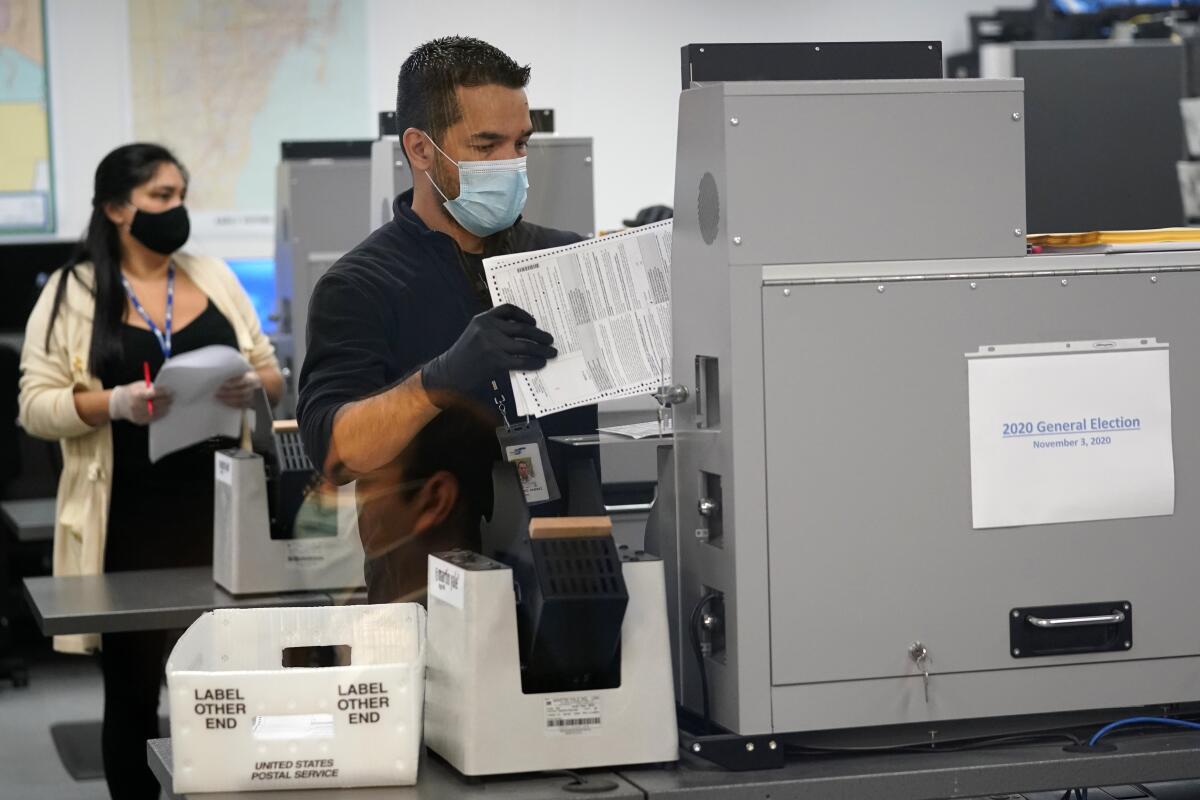When will you know if Biden or Trump wins? Look to these battleground states

- Share via
A record number of Americans — more than 59 million — had returned absentee ballots for the general election as of Sunday, after states expanded mail voting in an attempt to reduce the spread of the coronavirus.
Now, election officials just have to count them all.
But in some of the states that could decide the presidential race, election officials aren’t allowed to process, must less tally, mail ballots before election day. When America learns the final results could depend on when ballots are due and when they can be counted.
Some battleground states, such as Arizona and Florida, have long histories with absentee voting and have adopted laws to start at least the initial stages of ballot processing — like opening envelopes and checking signatures — early. Other states don’t allow ballots to be processed or counted until election day or the day before.
And Republicans nationally and in several states — including Pennsylvania, North Carolina and Wisconsin — have fought extended legal battles over added voter access and whether ballots postmarked by election day can be counted after Nov. 3. In 2016, President Trump carried Michigan, Wisconsin and Pennsylvania by razor-thin margins.
Election officials have emphasized that it’s more important to get an accurate and complete count than a speedy one, but Trump and his campaign have claimed otherwise. As part of his attacks on mail voting and his efforts to cast doubt on the legitimacy of an election in which polls show him behind, the president has falsely suggested that counting ballots after election day violates U.S. law, when in fact it is the norm.
“It would be very, very proper and very nice if a winner were declared on Nov. 3, instead of counting ballots for two weeks, which is totally inappropriate,” Trump said Oct. 27. Experts say that’s just not true; results are never finalized on election night.
President Trump and Joe Biden battled into Wednesday morning with no clear winner, as major contests remained too close. Biden urged patience, while Trump called the election into question.
After months of policy changes and lawsuits, here are the rules on when ballots are due and can be processed in the battleground states:
Arizona (11 electoral votes)
Excuse needed to vote absentee? No.
When are ballots due? Must be received by 7 p.m. Nov. 3.
When are ballots processed? Signature verification happens upon receipt. Vote tallying may begin 14 days before the election, but results may not be released until polls close.
Arizona residents have been voting by mail for decades, and the state allows people to permanently sign up to receive absentee ballots. The state is also familiar with the extended counting period that comes with mail ballots — it took six days for the Associated Press to call the 2018 Senate race for Kyrsten Sinema.
Florida (29 electoral votes)
When are ballots due? Must be received by 7 p.m. Nov. 3.
When are ballots processed? County officials were allowed to start tallying votes up to 30 days before Nov. 3.
The state has allowed no-excuse absentee voting since 2002, so voters are familiar with the process. State law says counties can begin processing ballots 22 days before the election. In June, Republican Gov. Ron DeSantis signed an executive order allowing them to start processing up to 30 days before, once they’d tested tabulation equipment.
Georgia (16 electoral votes)
When are ballots due? Ballots are due at 7 p.m. Nov. 3.
When are ballots processed? Signatures on the envelopes are verified when ballots are received. Ballot scanning began Oct. 19. Counting of votes may not begin before polls close.
In August, a federal judge blocked the state law requiring ballots to be received by 7 p.m. on election night and ruled that the state must accept ballots postmarked by election day and received in three days. After Republican Georgia Secretary of State Brad Raffensperger appealed, the 11th Circuit Court of Appeals upheld the election day deadline.
Michigan (16 electoral votes)
When are ballots due? Ballots must be received by 8 p.m. Nov. 3.
When are ballots processed? Processing starts Nov. 2; counting begins Nov. 3.
After thousands of ballots arrived too late to be counted in the state’s August primary, a state judge ruled that ballots postmarked by Nov. 2 would count if received within 14 days after the election. But the state appeals court on Oct. 16 blocked that decision, so by law, ballots are due by 8 p.m. Nov. 3. Democratic Gov. Gretchen Whitmer signed legislation Oct. 6 that allows election officials to begin processing ballots Nov. 2.
Minnesota (10 electoral votes)
When are ballots due? Mailed ballots must be postmarked by election day and received by Nov. 10. Voters can also turn in ballots in person by 3 p.m. Nov. 3.
When does ballot processing begin? Ballots are verified and accepted or rejected upon receipt. At the close of business on the seventh day before election day, officials may open the ballots and place them in a ballot box. Counting begins after polls close.
In Minnesota, which enacted no-excuse absentee voting in 2014, 6 out of 10 voters sent in ballots in the August primary. That month, a county judge ruled the state should allow general election ballots postmarked by Nov. 3 to be counted if they’re received by Nov. 10. An appeals court panel last week ordered all mail-in ballots received after 8 p.m. on election day be set aside, but it did not rule on the validity of those ballots.
North Carolina (15 electoral votes)
When are ballots due? Ballots postmarked by election day will be accepted until Nov. 12.
When are ballots processed? Election officials were allowed to begin processing ballots starting Sept. 29. Counting begins election day.
North Carolina officials expect to report on election night the totals for all in-person early voting ballots, election day ballots and mail-in ballots that arrive by Nov. 3, according to Patrick Gannon, a spokesman for the state’s election board. “Whether the media and/or candidates will be able to call winners ... will depend on how close contests are and how many absentee and provisional ballots remain to be counted after election day,” Gannon wrote in an email. State election officials agreed to extend the deadline for absentee ballots postmarked by election day from Nov. 6 to Nov. 12 as part of a consent decree resolving a lawsuit filed by a retirees group. After a protracted legal battle, the Supreme Court denied Republicans’ request to overturn the agreement.
North Carolina is a key state as Democrats try to redraw the political map. The state is trending blue, but it has disappointed them before.
Ohio (18 electoral votes)
When are ballots due? Ballots postmarked the day before the election will be accepted until Nov. 13.
When are ballots processed? Ballots can be processed as soon as they arrive and counted on Nov. 3.
Ohio’s secretary of state said the earliest tallies announced on election night will be the absentee ballots.
Pennsylvania (20 electoral votes)
When are ballots due? Ballots postmarked by election day must be received by election officials by 5 p.m. Nov. 6.
When are ballots processed? Counting and processing may begin at 7 a.m. Nov. 3.
Pennsylvania passed legislation last year allowing voters to request absentee ballots without an excuse. Following a request from election officials and a lawsuit from the state Democratic Party, the state Supreme Court in September ruled that ballots postmarked by election day and received by 5 p.m. three days after the election would count. The court also ruled that ballots that had a missing or illegible postmark would be considered on time if they weren’t obviously mailed after election day. Pennsylvania GOP leaders asked the U.S. Supreme Court to block the order. On Oct. 19, the high court deadlocked on the emergency request, allowing the Nov. 6 ballot deadline to remain.
Democratic Gov. Tom Wolf had called for allowing election officials to begin processing ballots sooner, after it took more than two weeks to complete the count of the June primary, but the state Legislature did not change the law.
Wisconsin (10 electoral votes)
When are ballots due? Ballots are due by 8 p.m. Nov. 3.
When are ballots processed? Processing and counting begins at 7 a.m. Nov. 3.
The state’s April 7 primary in some ways set the tone for the November election — voters chose to mail in their ballots in record numbers even in the midst of a chaotic legal fight; nearly 1 million people — 60% of primary voters — mailed in their ballots. The U.S. Supreme Court ruled that ballots in that primary had to be postmarked by April 7 but could be counted if they arrived by April 13. About 79,000 ballots arrived between April 8 and 13.
A federal judge in September granted voters the same six-day grace period for the November election in a Sept. 21 ruling, but after challenges from the Republican National Committee, the Wisconsin GOP and state Republican lawmakers, the ruling was blocked by a federal appeals court. So under state law, absentee ballots will be due by 8 p.m. Nov. 3. Democrats appealed, but the Supreme Court declined to overturn the lower court’s ruling.
More to Read
Get the L.A. Times Politics newsletter
Deeply reported insights into legislation, politics and policy from Sacramento, Washington and beyond. In your inbox three times per week.
You may occasionally receive promotional content from the Los Angeles Times.












